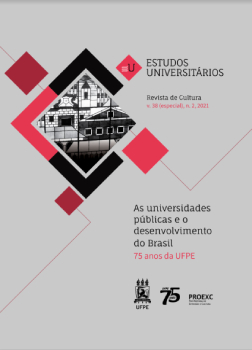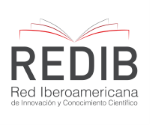Remote teaching in the pandemic context:“Para Além das Fronteiras: Videoconferênciasem RI” teaching project
DOI:
https://doi.org/10.51359/2675-7354.2021.251360Keywords:
Emergency Remote Learning. teaching project, video conferencing, pandemic, international relationsAbstract
This paper analyzes the challenges faced, during the Covid-19 pandemic, by education in Brazil, especifically the adoption of emergency remote teaching by the public university. In order to guarantee quality, universal access and a link between technical, teaching and student bodies, initia-tives were taken across the country. The Teaching beyond borders: video conferencing in IR project was an initiative of the International Relations course at the Federal University of Pelotas (UFPel). Through a partnership with teaching and research centers, the project established its own me-thodology based exclusively on the use of digital resources and remote access. Besides, it promoted numerous remote lectures with researchers from all over the country, fostered good debates and ensured the parti-cipants’ bond, guaranteeing universal access to the material produced. In this sense, this text aims, in a critical review format, to discuss the experience of the teaching project, whose first edition took place in the pandemic context of 2020, and to evaluate the use of remote learning, observing its potentialities and limitations. Through a literature review applied to the data that resulted from the project, we consider that the use of remote learning was, for the teaching project, satisfactory in terms of content and scope, but that it should be widely discussed in order to propose teaching-learning methodologies appropriate to the format and guarantee the maintenance of the connection between participants.
References
ALMEIDA, M. E. B.; VALENTE, J. A. Integração currículo e as tecnologias e a produção de narrativas digitais. Currículo sem Fronteiras, [s. l.], v. 12, n. 3, p. 57-82, set./dez. 2012. Disponível em: http://www.waltenomartins.com.br/pmd_aula1_art01.pdf. Acesso em: 30 abr. 2021.
BRASIL. Ministério da Educação. Decreto nº 9.057, de 25 de maio de 2017. Regulamenta o art. 80 da Lei nº 9.394, de 20 de dezembro de 1996, que estabelece as diretrizes e bases da educação nacional. Diário Oficial da União, Brasília, DF, 25 maio 2017. Disponível em: https://www.in.gov.br/materia/-/asset_publisher/Kujrw0TZC2Mb/content/id/20238603/do1-2017-05-26-decreto-n-9-057-de-25-de-maio-de-2017-20238503. Acesso em: 8 set. 2021.
BRASIL. Ministério da Educação. Portaria nº 343, de 17 de março de 2020. Dispõe sobre a substituição das aulas presenciais por aulas em meios digitais enquanto durar a situação de pandemia do Novo Coronavírus - COVID-19. Diário Oficial da União, Brasília, DF, 18 mar. 2020. Disponível em: https://www.in.gov.br/en/web/dou/-/portaria-n-343-de-17-de-marco-de-2020-248564376. Acesso em: 8 set. 2021.
DAVID, J. O uso das novas tecnologias na educação à distância e a aprendizagem construtiva. Educação a Distância, Brasília, v. 16, n. 70, p. 70-88, 1996. Disponível em: https://doi.org/10.24109/2176-6673.emaberto.16i70.2082. Acesso em: 21 jul. 2021.
HAJJ, Z. S. E. Educação presencial e não presencial no Brasil. In: CONGRÈS CONJOINT INSTITUT INTERNATIONAL DES COÛTS, 2007, Écully. Anais [...]. Écully: L'Institut International des Coûts, 2007. p. 1-15. Disponível em https://www.intercostos.org/documentos/apellidos/El%20Hajj.pdf. Acesso em: 29 jun. 2021.
HODGES, C. et al. The difference between emergency remote teaching and online learning. Educause Review, [s. l.], 27 mar. 2020. Disponível em: https://er.educause.edu/articles/2020/3/the-difference-between-emergency-remote-teaching-and-online-learning. Acesso em: 21 fev. 2021.
MOORE, J. L.; DICKSON-DEANE, C.; GALYEN, K. E-Learning, online learning, and distance learning environments: are they the same? The Internet And Higher Education, Columbia, v. 14, n. 2, p. 129-135, mar. 2011. Disponível em: https://www.sciencedirect.com/science/article/abs/pii/S1096751610000886. Acesso em: 27 jul. 2021.
MORAN, J. M. Ensino e aprendizagem inovadores com tecnologias auditivas e temáticas. In: MORAN, J. M.; MASETTO, M. T.; BEHRENS, M. A. As novas tecnologias e mediação pedagógica. São Paulo: Papirus, 2000.
MORAN, J. M. Metodologias ativas e modelos híbridos de educação. In: YAEGASHI, S. et al. (orgs.). Novas tecnologias digitais: reflexões sobre mediação, aprendizagem e desenvolvimento. Curitiba: CRV, 2017. p. 23-35. Disponível em: https://www2.unicentro.br/proen/files/2018/08/Metodologias_Ativas.pdf. Acesso em: 30 abr. 2021.
OYE, N. D.; SALLEH, M.; IAHAD, N. A. E-Learning methodologies and tools. International Journal of Advanced Computer Science and Applications (IJACSA), [s. l.], v. 3, n. 2, p. 48-52, 2012. Disponível em: https://citeseerx.ist.psu.edu/viewdoc/download?doi=10.1.1.259.3524&rep=rep1&type=pdf. Acesso em: 21 jul. 2021.
RONDINI, C. A.; PEDRO, K. M.; DUARTE, C. S. Pandemia do Covid-19 e o ensino remoto emergencial: mudanças na práxis docente. Interfaces Científicas - Educação, Aracaju, v. 10, n. 1, p. 41-57, set. 2020. Disponível em: http://dx.doi.org/10.17564/2316-3828.2020v10n1p41-57. Acesso em: 3 mar. 2021.
SILVEIRA, S. R. et al. O papel dos licenciados em computação no apoio ao ensino remoto em tempos de isolamento social devido à pandemia por Covid-19. In: POISSON, E. (org.). Série Educar, Prática Docente. Belo Horizonte: Editora Poisson, 2020.
SKYLAR, A. A. A comparison of asynchronous online text-based lectures and synchronous interactive web conferencing lectures. Issues in Teacher Education, San Francisco, v. 18, n. 2, p. 69-84, 2009. Disponível em: https://eric.ed.gov/?id=EJ858506. Acesso em: 22 jul. 2021.
TORI, R. Educação sem distância: as tecnologias interativas na redução de distâncias em ensino e aprendizagem. São Paulo: Artesanato Educacional, 2017.
UNIVERSIDADE FEDERAL DE PELOTAS (UFPEL). Pró-Reitoria de Ensino. Memorando-Circular nº 7/2020/PRE/REITORIA. Pelotas: Pró-Reitoria de Ensino da UFPel, 2020a. Disponível em: https://wp.ufpel.edu.br/pre/files/2020/03/SEI_UFPel-0912143-Memorando-Circular-Sustituicao-de-Aulas-Presenciais.pdf. Acesso em: 9 set. 2021.
UNIVERSIDADE FEDERAL DE PELOTAS (UFPEL). Conselho Coordenador do Ensino, da Pesquisa e da Extensão. Parecer Normativo nº 12, de 28 de maio de 2020. Aprova o Calendário Acadêmico Alternativo no contexto da pandemia do COVID-19, na Universidade Federal de Pelotas. Pelotas: Cocepe, 2020b. Disponível em: https://wp.ufpel.edu.br/scs/files/2020/05/SEI_UFPel-0958816-Parecer-Normativo-COCEPE-12.pdf. Acesso em: 9 set. 2021.
WILLIAMSON, B.; EYNON, R.; POTTER, J. Pandemic politics, pedagogies and practices: digital technologies and distance education during the coronavirus emergency. Learning, Media and Technology, [s. l.], v. 45, n. 2, p. 107-114, 2020. Disponível em: https://www.tandfonline.com/doi/full/10.1080/17439884.2020.1761641. Acesso em: 21 fev. 2021.













